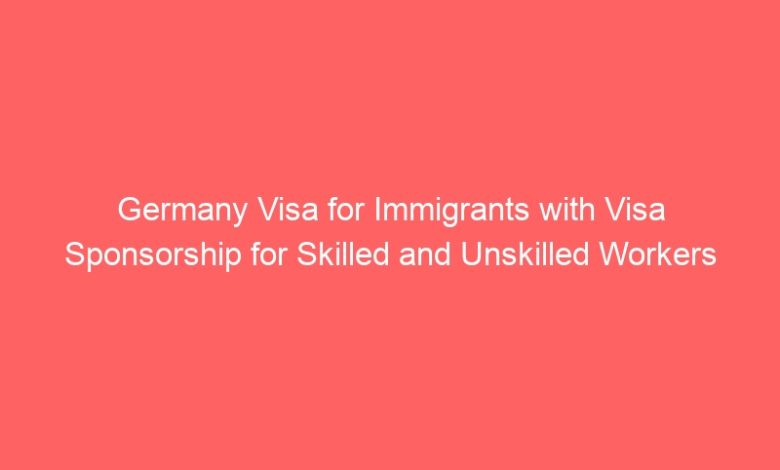Germany Visa for Immigrants with Visa Sponsorship for Skilled and Unskilled Workers

Have you ever dreamed of living and working in Germany but don’t know where to start?
Germany is one of the most attractive destinations for immigrants around the world. With a strong economy, excellent healthcare, and thousands of international job openings, the country continues to welcome both skilled and unskilled workers every year.
In this complete 2025 guide, you’ll learn everything about the Germany visa process, how visa sponsorship works, and what pathways are available, whether you’re a professional, student, or someone looking for a fresh start in Europe.
Understanding the German Visa System
Germany’s visa system is designed to help people from different backgrounds start new lives abroad. The government recognizes the need for foreign workers and students, which is why it offers several types of residence permits depending on your purpose of stay.
For most people, the visa journey begins with identifying which category fits best, work, study, business, or family. Each has its own rules and requirements, but all share one goal: to help newcomers integrate successfully into German society.
Understanding how these visas work will make your relocation smoother and increase your chances of approval.
Main Types of Residence Permits in Germany
Here are the most common residence permits that allow foreigners to live, work, or study in Germany:
-
Work Visa / Employment Residence Permit: For people who already have a job offer or signed employment contract from a German company.
-
Student Visa: For international students accepted into a university, college, or vocational training program.
-
Family Reunification Visa: For spouses, children, or parents joining family members already in Germany.
-
Freelancer or Self-Employment Visa: For entrepreneurs, digital workers, and consultants who want to build a business or work independently.
-
EU Blue Card: A premium visa for highly qualified professionals with higher income levels, offering fast-track access to permanent residency.
Each visa type opens doors to long-term opportunities, allowing you to settle, work, and eventually apply for permanent residence in Germany.
What Visa Sponsorship Means in Germany
Visa sponsorship simply means that a company, school, or family member supports your visa process and helps you move legally to Germany. For example, a German employer might “sponsor” your work visa by providing a job offer, contract, and proof that your skills are needed.
There are different kinds of sponsorships:
-
Employer sponsorship: The most common — a German company hires you and backs your visa.
-
Family sponsorship: For spouses or relatives joining loved ones already living in Germany.
-
Educational sponsorship: For students admitted to recognized universities or research programs.
-
Startup or business sponsorship: For entrepreneurs with innovative business ideas supported by investors or incubators.
-
Government sponsorship: For people with specialized skills or expertise in high-demand industries such as healthcare, engineering, or IT.
Having sponsorship often makes your visa process faster and more likely to be approved.
Employer Sponsorship for Work Visas
If you want to work in Germany, employer sponsorship is one of the best routes. When a company hires you, it provides the necessary paperwork that proves your employment, which becomes the foundation for your work visa and residence permit.
Basic Requirements
To qualify, you’ll usually need:
-
A valid job offer or employment contract.
-
Relevant education or vocational training.
-
Health insurance coverage.
-
A clean criminal record.
-
Proof of financial stability for the first few weeks before your first salary.
Language proficiency isn’t always mandatory, but having basic German skills will make your integration easier and improve your visa approval chances.
Can Unskilled Workers Get Sponsored?
Yes and this is where things get exciting for 2025.
Germany has introduced new immigration reforms to attract workers for roles that don’t require university degrees. The Opportunity Card (Chancenkarte) now allows people with at least two years of vocational training or relevant work experience to move to Germany and search for a job for up to one year.
This system uses a points-based approach that considers your education, work experience, language ability, and age. Once you find employment, you can easily switch to a residence permit for work.
Industries such as logistics, hospitality, caregiving, agriculture, and cleaning services frequently hire unskilled or semi-skilled foreign workers.
Student Visa Sponsorship
Germany is also a global education hub, offering affordable or even tuition-free learning at many public universities.
To apply for a student visa, you’ll need:
-
An admission letter from a German institution.
-
Proof of funds (usually through a “blocked account”).
-
Valid health insurance.
-
Language certificates (if required by the program).
Students can work part-time during their studies and later transition to full-time employment through a post-study work visa or job-seeker permit. Many international graduates stay and build successful careers in Germany after completing their studies.
Family Reunification Visa Sponsorship
Germany values family unity, and the family reunification visa allows close relatives to live together. Spouses, children, and parents of residents or citizens can apply, provided there is enough income and housing space.
Once approved, family members enjoy similar rights to the main visa holder, including healthcare access and, in many cases, permission to work or study.
Freelance and Self-Employment Visa Sponsorship
If you’re self-driven or want to run your own business, Germany’s freelancer visa (Freiberufler) and self-employment visa offer fantastic opportunities.
Applicants must show:
-
A clear business plan or professional portfolio.
-
Proof of financial stability and startup capital.
-
Professional qualifications or work experience.
This visa is perfect for consultants, digital nomads, designers, content creators, and tech professionals. It’s also a strong route to long-term residence if your business performs well.
Startup and Entrepreneurial Visas
Germany’s startup scene is booming, especially in Berlin, Munich, and Hamburg. The country offers a startup visa for founders with innovative business ideas and investment potential.
You’ll need a solid business plan, funding proof, and possibly an endorsement from a German incubator or accelerator. Once approved, you can live in Germany, launch your company, and eventually qualify for permanent residency through your business activities.
Government and High-Demand Skill Visas
Germany actively recruits professionals in industries facing labor shortages. If you work in healthcare, IT, construction, or engineering, you’re in luck, these are among the most in-demand fields.
Applicants with recognized qualifications, experience, and job offers in these sectors can apply for fast-tracked government-endorsed visas like the Skilled Worker Visa or EU Blue Card. These programs lead to long-term residence and often higher salary opportunities.
Frequently Asked Questions (FAQs)
1. Can I apply for a German visa without a sponsor?
Yes, certain visa types like the student visa, freelance visa, or job-seeker visa allow you to apply without sponsorship.
2. How long does it take to process a sponsored visa?
Processing usually takes 4–12 weeks, depending on the type of visa and your location.
3. Can unskilled workers apply for jobs in Germany?
Yes, under the new immigration reforms and Opportunity Card system, even workers without university degrees can apply if they meet basic eligibility.
4. Can I bring my family to Germany?
Yes, most visa categories allow you to bring family members under the family reunification program.
5. What are the costs involved?
Visa fees generally range between €60 and €100, plus costs for insurance, translation, and document verification.
In Summary
Moving to Germany in 2025 could be one of the best decisions of your life. The country’s visa sponsorship programs make it possible for both skilled and unskilled workers to build stable, rewarding lives in Europe.
With the right information, preparation, and documents, you can confidently take the first step toward your German dream, whether that means starting a new career, studying abroad, or reuniting with loved ones.
Germany isn’t just looking for workers; it’s welcoming people ready to contribute, learn, and grow. Your opportunity begins now.




